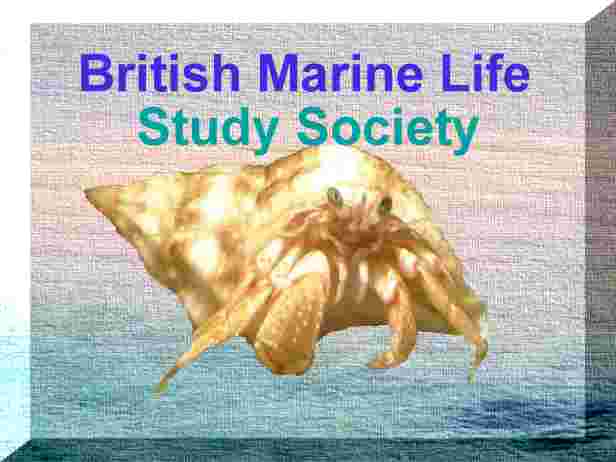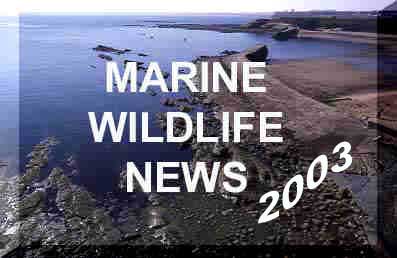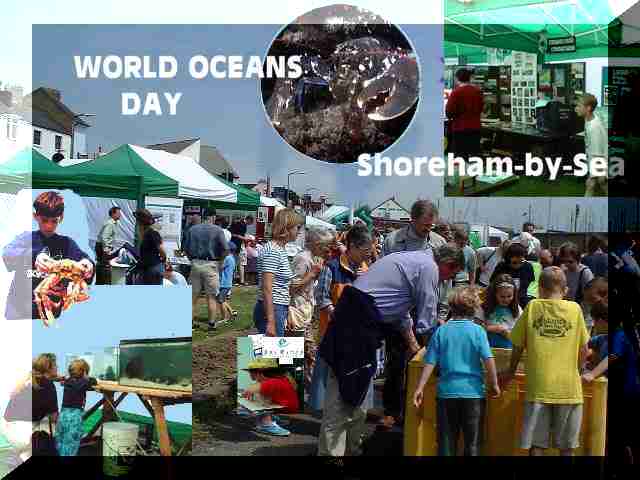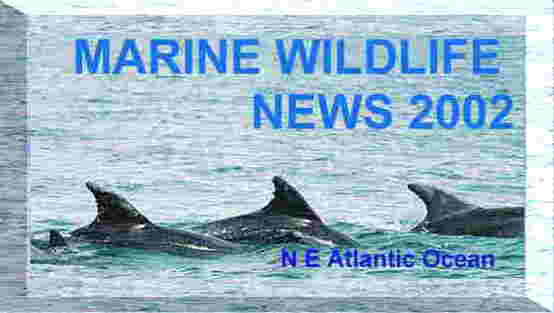-
|

-
Monthly
electronic news bulletin for the marine life of the NE Atlantic Oceans
including the seas around the British Isles.
The
bulletin is designed for Microsoft Explorer 4 and above using medium fonts
at a resolution of 800 x 600.
Subscribe
and unsubscribe options are at the foot of this page.
|
|
If
you receive this bulletin as an EMail subscriber, you may find the best
way to view the file is on your hard disc in your directory of Incoming
EMails.
|
| MARINE
LIFE NEWS
Reports
of marine wildlife from all around the British Isles, with pollution incidents
and conservation initiatives as they affect the flora and fauna of the
NE Atlantic Ocean.
--------------------------------------------------------------------------------------------------------------------------
21
February 2003
Tony
Heart caught a Pollack on angling tackle over
a depth of 50 metres of water with a Sea
Lamprey, Petromyzon marinus, attached
23 miles WNW of Corbiere, Jersey, roughly 8 miles SW of Hanois Light, Channel
Islands.

The
Sea Lamprey was
51.8 grams in weight and 267 mm in length. This jawless fish is still reasonably
common but there are few records from the Channel Islands. In recent past
they have been eaten.
Original
Report and Discussion (Link)
Channel
Islands Wildlife Discussion Forum
BMLSS
Lamprey page
c.
20 February 2003
Angler
Val
Fletcher struggled for 40 minutes to reel
a unique shore capture of the deep oceanic fish known as the Oarfish,
or Ribbonfish, Regalecus glesne, off
the north-east coast of England at Skinningrove, Cleveland. This rare fish
caught on a squid bait came as a bit of a shock, even scary, as first the
head and then the whole length of its 3.3 metres emerged from the sea.
This elongate silvery fish, with red fins weighed in at 63.5 kg, which
actually meant it was rather a small one for arguably the largest, certainly
the longest bony fish in the mostly deep oceans (found down to 1000 metres)
attaining a normal length of 7 metres and a maximum of over 11 metres,
and a maximum weight of 272 kg.
So
unusual was this discovery that it ranks as perhaps the most unusual of
all records on these news pages. Unfortunately, there does not seem to
be a photograph of the find.
Link
to Photograph
An
alternative story is that the Oarfish became trapped in a net and was brought
ashore dead. This seems a more likely occurrence.
The
last record of an Oarfish washed up on the British coasts goes back to
1981, again on a North Sea coast at Whitby, north Yorkshire. There are
only two known photographs of an Oarfish in the wild, which shows that
its main method of swimming is vertical, propelled by its dorsal
fin. However, there are reports of young Oarfish swimming below the surface
in a sinuous manner.
The
Oarfish has a wide distribution in all the deep oceans with most records
from the tropics. It is one of two fish in the family Regalecidae.
The
similar Ribbonfishes are in the family Trachipteridae.
Original
Report and Discussion (Link)
Times
Report
Fishbase
Entry
16
February 2003
A
117 cm pup long of a Bluntnose Sixgill
Shark, Hexanchus griseus,
was landed at Mevagissey, south Cornwall. The shark weighed 6.3 kg before
gutting. The Bluntnose Sixgill Shark
is principally a deep water species, usually found offshore and near the
bottom at depths of up to 1,800 metres. Young specimens can however
occasionally be found inshore in cold water at depths as shallow as 25
- 50 metres, especially near rocky coasts or islands where deep water occurs
close by. The shark was caught by a small day boat FV
Soft Shadow in a bottom set net (gill net).
These boats do not usually fish more than six to ten miles offshore where
the maximum depth would be 65 metres.
Sixgill
Shark pups measure 65 cm - 70 cm at birth
and can grow up to at least 4.8 metres (over 15 ft) long. This grey coloured
sharks is unusual in that compared with most species of shark, they have
an extra pair of gills. Females are thought to have 22 - 108 pups per litter.
Full
Report
13 February
2003
One
adult and one juvenile Humpback
Whale, Megaptera
novaengliae, are seen 100 metres off Cove, near Aberdeen, north east
Scotland. They swam slowly north past Girdleness breaching about one mile
offshore in Aberdeen Bay. This large whale is
regularly seen around the
Shetland
Isles but rarely ventures further south.
A solitary Humpback
Whale was also seen the Firth of Forth
and this similar to one described recently from the Moray Firth so this
13 metre long whale may be the same animal.

|
| WORLD
OCEANS DAY
 In
June 1992, over 150 Heads of States signed the Convention on
Biological
Diversity at Rio de Janeiro. They did so to express a shared belief
that action must be taken to halt the worldwide loss of animal and plant
species and genetic resources. In
June 1992, over 150 Heads of States signed the Convention on
Biological
Diversity at Rio de Janeiro. They did so to express a shared belief
that action must be taken to halt the worldwide loss of animal and plant
species and genetic resources.
World
Oceans Day was first declared as 8th June at the Earth Summit in Rio de
Janeiro in 1992.
Events
will occur all around the world on and around this day.
Are you running
an event this year?
If
you are running a World Oceans Day event this year, please send me details
so the information can be out on the World Oceans Day
web page. Ideally you will construct your web page for your event, so all
I will do is put in an Internet link.
If
you do not have any web space, you can still design a web page and it can
be uploaded on space provided on the Smart Groups World
Oceans Day eforum.
This
forum is for discussion of all aspects of running a World Oceans day event
and all marine life exhibitions, including exchange of ideas, resource
sources, and mundane matters like Public Liability Insurance.
Adur World Oceans
Day
2003
Adur Exhibition
Adur
will be one of the leaders in the United Kingdom when it presents an exhibition
celebrating the official World Oceans Day. The event will take place on
Saturday
31 May 2003 in Shoreham-by-Sea,
on Coronation Green
at the start of the Adur Festival.
|
| PICTURE
GALLERY
Each
month, at least one special marine image will be published from images
sent to the BMLSS. This
can be of the seashore, undersea world or any aspect of the marine natural
world, especially the underwater life, but not restricted to life beneath
the waves. Topical inclusions may be included instead of the most meritorious,
and images will be limited to the NE Atlantic Ocean and adjoining seas,
marine and seashore species and land and seascapes.
-------------------------------------------------------------------------------------
Only one
species of hermit crab found in the NE Atlantic and seas around the British
Isles has its major claw on left nearest the apex of the adopted shell
Photographs
by Andy Horton
---------------------------------------------------------------------------------------------------------------------------------
Seashore Images
Divers
report seeing female Dragonets far more often
than the males that are colourful in breeding condition with an elongated
first dorsal fin

Male
Dragonet,
stranded out of the water on Les Minquiers, Channel Islands
March
2002
Photograph
by Nicolas
Jouault
----------------------------------------------------------------------------------------
The
name of the particular coast should be included and the grid reference,
if known. Print photographs can be included in Exhibitions
and on the BMLSS Web Sites and electronic publications. Electronic images
in *.JPG format can also be considered for the web site. They should not
exceed 150K in size.
 Click
on the album for more links (On-line link) Click
on the album for more links (On-line link)
Shore
Topography Portfolio

|
| DIARY
In
chronological order, the most recent events are at the top of the page.
Events open to the public, free or for a nominal charge only are included.
Most Seminars need to be booked in advance.
---------------------------------------------------------------------------------------------------------------------------------
BIOSIS
Conference Calendar for Zoology
(Major
Link of all biological conferences around the world)
---------------------------------------------------------------------------------------------------------------------------------
 SAMS
Seminar Series SAMS
Seminar Series
The Scottish
Association for Marine Science (SAMS)
Dunstaffnage Marine Laboratory, Dunbeg,
Oban, Argyll PA37 1QA
Tel: 01631 559000 Fax: 01631 559300
Email: mail@dml.ac.uk
For more details/how to find SAMS
see our website: http://www.sams.ac.uk
Unless otherwise stated, seminars
are held on Fridays at 4:15 pm
in the SAMS Conference Room
** Followed by the Friday R&R **
7 March
- Craig Brown (SAMS).
Seeing
in sound – marine habitat mapping
21
March - David
Hughes (SAMS). Grow with the flow: sex
and survival in the clone zone
4
April - Liz Cook
(SAMS). BIOFAQs (Biofiltration in Aquaculture)
– Can mussels make a difference?
17
April (Thursday 12.00 noon) - Liam
Fernand (CEFAS). Summertime circulation
of water around the UK
For more details
on the forthcoming talks, please contact Murray
Roberts (mailto:mr-t@dml.ac.uk)
or tel: 01631 559 000
15
March 2003
Opening
of the SAMS 'IN TO THE ABYSS' Exhibition at the Scottish Sea Life Sanctuary
in Barcaldine (11 am - 4 pm). As a National Science Week event, the opening
will be accompanied by talks on different aspects of deep-sea science by
SAMS researchers and is open to all. The exhibition features the only public
display of deep-water corals in the UK.
---------------------------------------------------------------------------------------------------------------------------------

A
series of monthly talks on marine conservation topics
These
talks are open to the public, admission is free.
6 March
2003
Walking
the dog whelk - Simon Bray
3
April 2003
ROV
deep sea fish watching - Ian Thomas
1
May 2003
Fishy
Tales - Peter Henderson
The
Marine Life Talks are held on the first Thursday of the month at 7.30 pm,
please arrive at 7.15 pm to be met in Reception. Southampton Oceanography
Centre is reached via Dock Gate 4 (between Town Quay and Ocean Village).
---------------------------------------------------------------------------------------------------------------------------------
8
March 2003 (Saturday)
Earthwatch Project:
Marine Life talks
10:00
am - 5:15 pm
Venue:
Imperial College, London
Earthwatch Open
Day
Earthwatch
scientists will provide in-depth information about their projects and the
volunteering experience. There will also be the opportunity to
participate
in a series of workshops covering a number of topics from travel
tips
to travel photography.
Marine
naturalist Colin Speedie will
talk about his research into Britain's
Basking
Sharks, Dr. Vincent Pieribone
will describe his project 'Luminous Life in the Great Barrier Reef'
and Earthwatch volunteer
Roger Griffin
will
be recounting his experiences on 'Crocodiles of the Okavango¹.
Tickets:
Earthwatch members £10.00; Non-members £12.50; Student concession
£10.00. Coffee breaks and a sandwich lunch included.
Contact
Earthwatch, Tel 01865 318856; Fax. 01865 311383;
EMail:
info@earthwatch.org.uk
Web
Page: www.earthwatch.org/europe
|
NEW
PUBLICATIONS & WEB PAGES
|
SOCIETY
INFORMATION
The
British Marine Life Study Society are responsible for producing the journal
GLAUCUS,
which is the first publication exploring the marine life of the seas surrounding
the British Isles available to the general public.
---------------------------------------------------------------------------------------------------------------------------------
Change of EMail
Address
 Please
note that the EMail address for messages to the British Marine
Life Study Society has now changed Please
note that the EMail address for messages to the British Marine
Life Study Society has now changed
from
bmlss@compuserve.com
to Glaucus@hotmail.com
Messages
to the first address will not receive any guarantee of a reply and from
year 2003, the old EMail address is expected to fall into disuse.
---------------------------------------------------------------------------------------------------------------------------------
Membership 2003
Current
members will
have their subscriptions waived for year 2003. An explanation was sent
before Christmas. This is because of he computer breakdown and the failure
of the full complement of paper publications.
|
|
Bulletin
Details
If
you receive this Bulletin direct from the British Marine Life Study Society
it will contain only hypertext and image (*.htm *.gif & *.jpg) files.
Recipients
can only unsubscribe if the Bulletin is received directly from the
BMLSS.
Permission
is granted to forward the Bulletin on unaltered. However, you will have
to include the images separately.
Subscribe/Unsubcribe
http://groups.yahoo.com/group/BMLSS-Torpedo
To
save download times, only new images are included with each Bulletin.
The
Bulletin is designed to be viewed on Internet Explorer using medium
fonts
at
a resolution of 800 x 600.
Viewing
should be possible on Netscape and other browsers.
|
Printing
the two column version of Torpedo (from issue 28)
These
pages are not designed for the default settings on the Page Set-ups of
your browser. I recommend viewing in Microscope Internet Explorer 6 and
altering the right and left hand columns in the Page Set-up menu to 9 mm
(from 19 mm).
The
page set-up can also be amended in Netscape Composer and other web page
editors, and this has the advantage of enabling the specified number of
pages to be printed and the information about the file (name, path, date)
to be deleted.
Some
of the images may not display if you have changed your directory for downloaded
files. The images may also not display properly if your settings on your
EMail software do not allow you do this automatically. When received in
Pegasus the format is changed slightly, but the bulletin is still readable.
|
---------------------------------------------------------------------------------------------------------------------------------
Compiled
on Netscape Composer 4.7 and other programs
|














